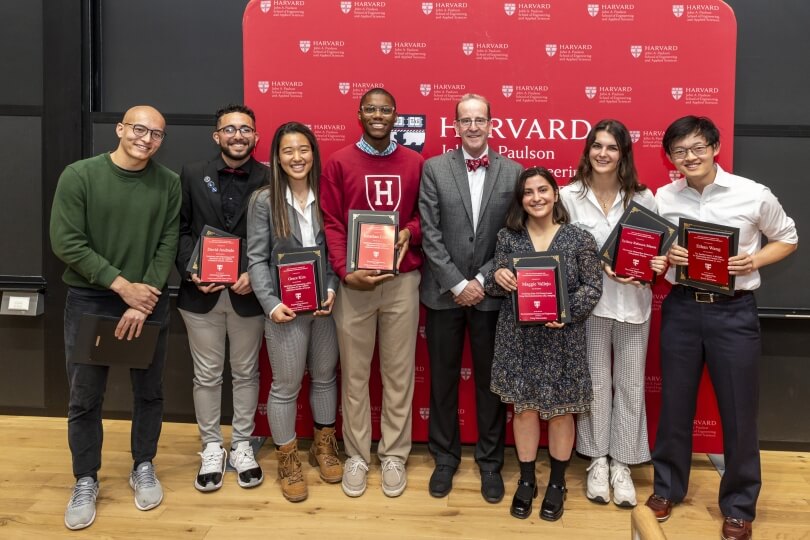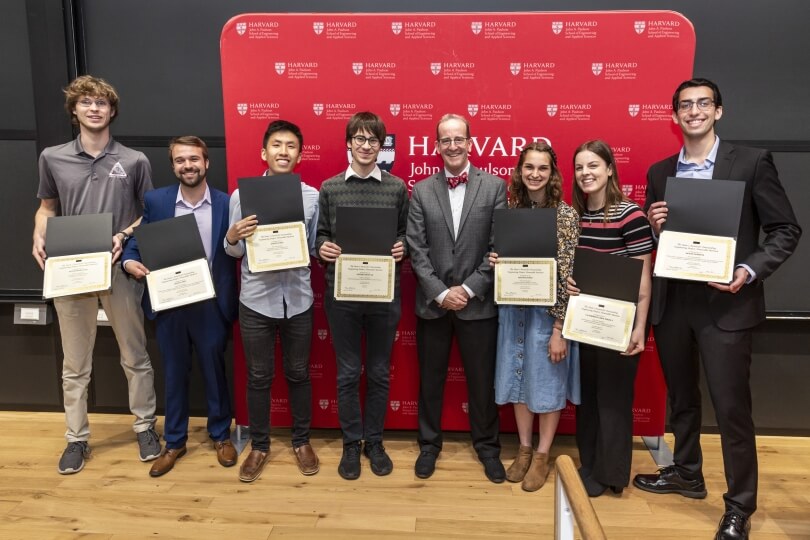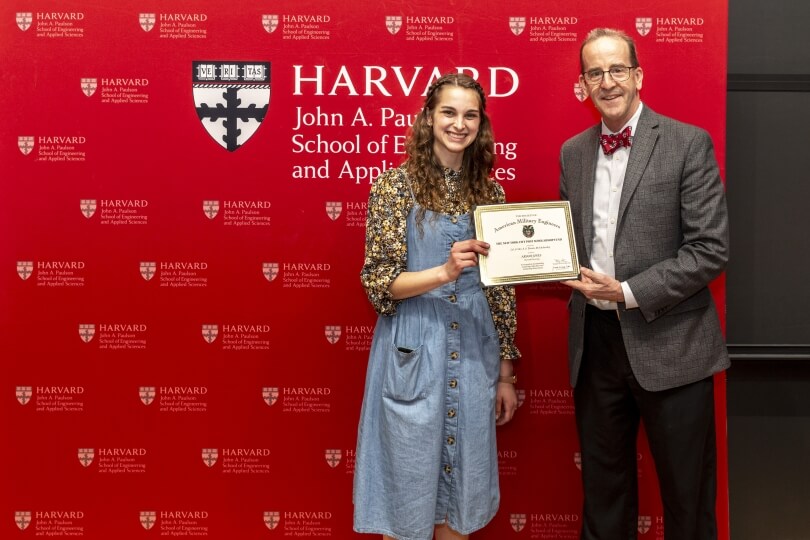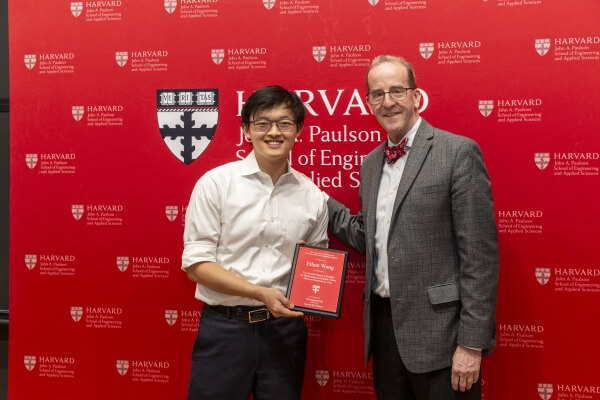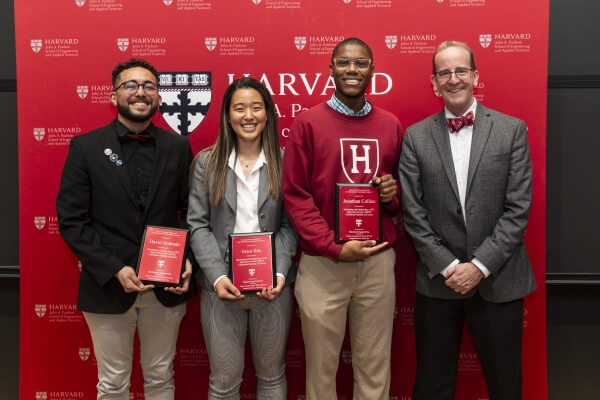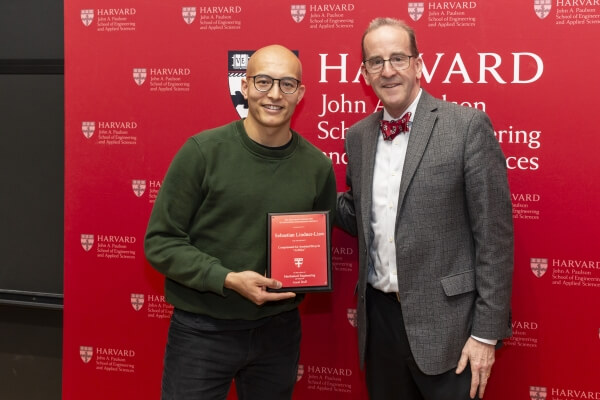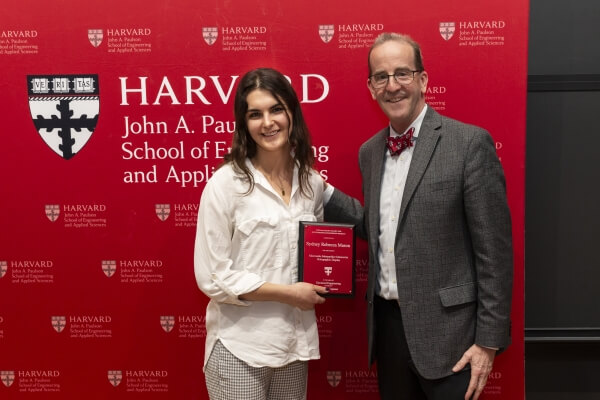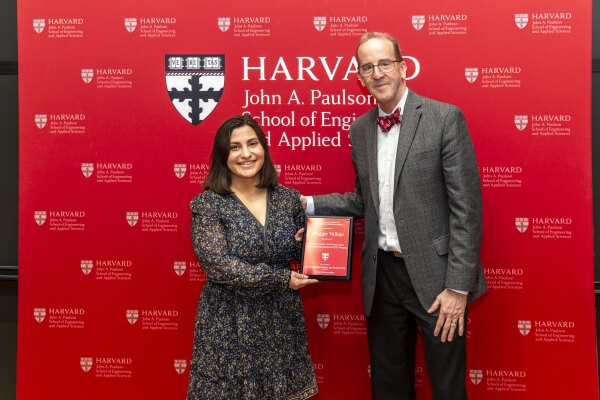News
Seven SEAS seniors receive their Dean’s Award for Outstanding Engineering Projects from Dean Frank Doyle for their capstone projects. (Kathy Tarantola Photography)
Seven students from the Harvard John A. Paulson School of Engineering and Applied Sciences (SEAS) were recognized with the Dean’s Award for Outstanding Engineering Projects at the recent SEAS Design and Project Fair at the Science and Engineering Complex. Recipients participated in ES100, a year-long capstone course for seniors in the SB engineering program, where each student develops a creative project to address a real-world engineering problem. The award comes with a prize of $500.
“The mission of SEAS is, through teaching and collaborative research, to discover, design and create novel technologies and approaches to societal challenges in service to the world, the nation, and our community,” said SEAS Dean Frank Doyle. “The students we recognize today with the Dean’s Awards for Outstanding Engineering Projects have taken that mission to heart through their studies and their projects. SEAS students make things that may be really cool, quirky, or fun. And just as often, their work will help solve a real-world problem and have a significant impact on people’s lives.”
For the 2022-23 academic year, 44 students completed ES100 senior projects, including four multi-student group projects sponsored by the NASA Jet Propulsion Lab (JPL). Jonathan Collins, David Andrade and Grace Kim all took home a Dean’s Award for their JPL project, “Machining and Optimizing a GNC Subsystem for the CaliPER Calibration Satellite of Europa Clipper.” They designed the guidance, navigation and control system for a cube satellite that will help calibrate NASA’s larger Europa Clipper satellite, which will explore one of Jupiter’s moons.
“It was really awesome for me to do something that would have a great impact and be able to literally go to the stars,” said Collins, an electrical engineering concentrator. “I learned so much about mechanical and electrical engineering, and I also learned how to collaborate and iterate on each design. It really sharpened my skills as an engineer.”
The other four award winners are:
- Sebastian Lindner-Liaw, mechanical engineering, for his project, “AirBike - Compressed-Air Assisted Bicycle”
-
SEAS seniors with Dean Frank Doyle after receiving their Honorable Mention certificates for their senior capstone projects. (Kathy Tarantola Photography)
- Maggie Vallejo, environmental science and engineering, for her project, “Using Electroluminescence Imaging to Predict Solar Cell Power Losses”
- Ethan Wang, bioengineering, for his project, “The SeaStar: A Tissue-Engineered Hydrogel Insert Recreating Physiological Conditions for Diet-Mediated Biometabolism”
“The heart has to create its own energy in order to power its functions,” Wang said. “My project looks at how the heart’s energy-generating processes work, and how to create a better method to measure it. I used tissue engineering methods to recreate what’s going on in the heart, but outside of the heart so the processes can be isolated and studied in a laboratory setting.”
Nine additional SEAS students received Honorable Mentions for their capstone projects. They are:
- Egemen Bostan, engineering sciences, for his project, “Electrical Simulation of Optical Modulators in Lithium Niobate”
- Aaron Chin, electrical engineering, for his project, “Designing an Actuator Optimized for Haptic Force Feedback in Virtual Reality”
- Catherine Mailly, bioengineering, for her project, “Model System for Sustained and Targeted Drug Delivery using Nanoparticle-Loaded Cellular Backpacks”
- Adam McMullin, mechanical engineering, for his JPL project, “CubeSat Bus for CaliPER Mission in Support of Europa Clipper”
-
Ariann Jones receives her award from the Society of American Military Engineers for her senior capstone project. (Kathy Tarantola Photography)
- Margaret Schultz, environmental science and engineering, for her project, “Real-time high-resolution downscaling of fine particulate matter in the U.S. using machine learning”
- Jaxson Hill and Jason Martell, mechanical engineering, for their JPL project, “Design of the Calibration Trajectory and 3D-Printed Warm Gas Propulsion System for an Auxiliary CubeSat for the NASA JPL Europa Clipper Mission”
- Ariann Jones, bioengineering, for her project, “Dockable Artificial Intelligence-Guided Ultrasound Interventional Device (AI-GUIDE)”
Jones also received a $500 award from the Society of American Military Engineers for her project, which redesigned a more easily transportable prototype medical device that can stop blood hemorrhages in the femoral region of the body. Jones is a Reserve Officer Training Cadet for the United States Air Force, and earlier this year became Commander of her unit. She’ll join the U.S. Space Force later this year.
2023 Winners
Topics: Academics, Applied Physics, Awards, Bioengineering, Electrical Engineering, Environmental Science & Engineering, Materials Science & Mechanical Engineering, Optics / Photonics
Cutting-edge science delivered direct to your inbox.
Join the Harvard SEAS mailing list.
Press Contact
Matt Goisman | mgoisman@g.harvard.edu
